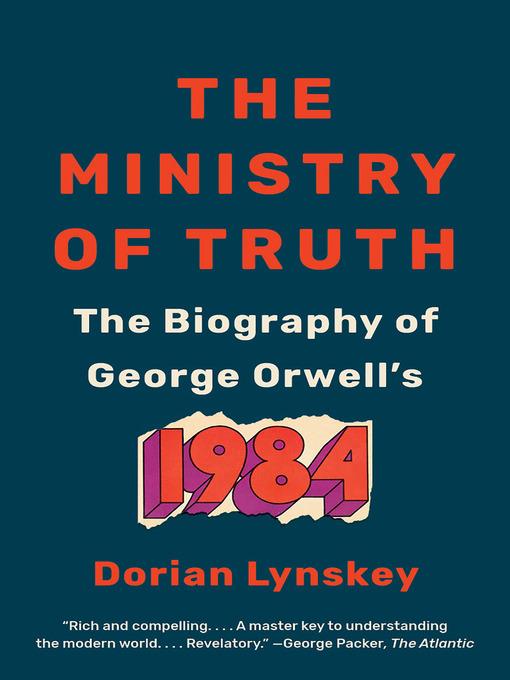
The Ministry of Truth
The Biography of George Orwell's 1984
کتاب های مرتبط
- اطلاعات
- نقد و بررسی
- دیدگاه کاربران
نقد و بررسی

February 1, 2019
Music critic for the Guardian, Lynskey expands into cultural criticism as he considers George Orwell's 1984, moving from its origins in utopian and dystopian literature and Orwell's experiences in wartime Great Britain to its profound impact upon our culture.
Copyright 2019 Library Journal, LLC Used with permission.

April 8, 2019
Lynskey (33 Revolutions Per Minute) offers an entertaining but scattershot study that places George Orwell’s 1984 in a variety of contexts: the author’s life and times, the book’s precursors in the science fiction genre, and its subsequent place in popular culture. Lynskey delves into how Orwell’s harrowing Spanish Civil War experiences shaped his concern with political disinformation by exposing him to the deceptiveness of people he’d once regarded as allies against fascism: the Soviets and their Western apologists. Another section offers a history of Edward Bellamy’s 1888 bestseller Looking Backwards, as a leading example of the once-thriving genre of utopian literature and as an optimistic counterpoint to 1984’s totalitarian nightmare. While Lynskey calls this a “biography” of 1984, anyone expecting a granular examination of the novel itself will likely be disappointed. Lynskey spreads himself too thin, veering away from his purported subject: is it important to know, for example, that H.G. Wells, identified here as a major influence on Orwell, was a difficult child? Lysnkey is strongest, by far, in his analysis of the novel’s influence on rock musicians, especially David Bowie. While his book offers some intriguing insights, one longs for a stronger and more intense focus on 1984 itself.

April 15, 2019
The life and afterlife of the celebrated--and seemingly evergreen--novel. Music, film, and politics writer Lynskey (33 Revolutions Per Minute: A History of Protest Songs, from Billie Holiday to Green Day, 2011) reminds us that George Orwell's Nineteen Eighty-Four has been the book "we turn to when truth is mutilated, language is distorted, power is abused, and we want to know how bad things can get." The "fact that the novel speaks to us so loudly and clearly in 2019," he writes, is a "terrible indictment of politicians and citizens alike." The author tells his vibrant, spirited story of a man and his book in two parts. He first recounts how Orwell came to write the novel and describes in detail the world he inhabited. In the second section, he follows the "political and cultural life" of Nineteen Eighty-Four, originally titled The Last Man in Europe, from "Orwell's death to the present day." Lynskey does a superb job analyzing the young Orwell's political beliefs, his hatred for fascism, and his "vision of common-sense radicalism." He had a special admiration for Charles Dickens, whom he described as "generouslyangry." Lynskey traces Orwell's early influences, from H.G. Wells, who "loomed over Orwell's childhood like a planet," to Jack London and Yevgeny Zamyatin's "anti-utopian novel We." Arthur Koestler's "masterpiece," Darkness at Noon, provided Orwell with Nineteen Eighty-Four's "mental landscape." Though never a wealthy man, Orwell found success with Animal Farm, which provided him with the funds to finish Nineteen Eighty-Four, which he edited continuously for three years while he was quite ill. It published in June 1949; Orwell died 227 days later. Lynskey next traces the novel's impact, from the Cold War era to today, on politics and other writers; film and play versions; contemporary music and TV shows; and the "most celebrated television commercial" of the 1980s, Apple's Macintosh computer launch. As Lynskey somberly concludes in this fascinating literary history, Nineteen Eighty-Four's 70th anniversary "falls at a dark time for liberal democracy."
COPYRIGHT(2019) Kirkus Reviews, ALL RIGHTS RESERVED.

























دیدگاه کاربران